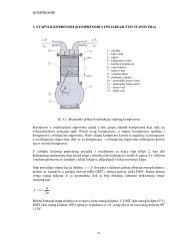universityâenterprise cooperation
universityâenterprise cooperation
universityâenterprise cooperation
You also want an ePaper? Increase the reach of your titles
YUMPU automatically turns print PDFs into web optimized ePapers that Google loves.
support services and persons committed<br />
to and specialised in promoting and<br />
implementing the <strong>cooperation</strong> between<br />
the universities and enterprises;<br />
3. Curricular involvement of enterprises to<br />
upgrade and update the curriculum;<br />
4. Joint research realized by universities<br />
and enterprises;<br />
5. Support given to the creation of companies;<br />
6. (Transnational) Mobility activities or<br />
schemes;<br />
7. Involvement in local and regional development.<br />
To this end, critical success factors in<br />
supporting strategies university-enterprise<br />
<strong>cooperation</strong> can be summarized as follows:<br />
• Cooperation should be shown as being<br />
beneficial to both parties: a win - win<br />
situation for both parties at all levels<br />
and in all activities;<br />
• Is supported by clear agreements or a charter<br />
of <strong>cooperation</strong> between parties concerned;<br />
• Is best embedded into the overall policy<br />
and mission statement of the university<br />
and into strategic plans;<br />
• Is coordinated and implemented by<br />
official bodies or structures which report<br />
on a regular basis to all the governing<br />
structures concerned;<br />
• Is integrated at all levels of the<br />
university: at the political and strategic<br />
level as well as at the operational level,<br />
at the curriculum level, at Research and<br />
Development level etc.;<br />
• Is incorporated in all faculties and all<br />
departments of the universities;<br />
• Is closely linked and intertwined with the<br />
European and international <strong>cooperation</strong><br />
strategy and mobility of the university.<br />
Additionally:<br />
• All stakeholders (students, professors,<br />
companies etc.) are involved in the<br />
development and the implementation<br />
of <strong>cooperation</strong>;<br />
• University-enterprise <strong>cooperation</strong> policies<br />
and activities are regularly reviewed and<br />
evaluated and clearly assessed by all<br />
stakeholders;<br />
• University-enterprise <strong>cooperation</strong> bodies<br />
or offices are run by people with experience<br />
from industry to manage them;<br />
• Universities should develop partnerships<br />
with the world of enterprise while enterprises<br />
could help universities to modify curricula<br />
and governance structures.<br />
3.2.3. Recommendations<br />
Following the Commission’s analysis results<br />
the EU needs to work harder in the future<br />
for the purpose of integration all three parts<br />
of the knowledge triangle. The Commission<br />
has stressed:<br />
• The lack of innovation and entrepreneurial<br />
culture in research and higher education;<br />
• The fragmentation of the EU’s research<br />
and higher education system;<br />
• A lack of investment, in particular private<br />
investment, in research and development;<br />
• The lack of a critical mass and innovation<br />
in small and medium-sized enterprises.<br />
At the European level, actions are then needed<br />
to create the necessary conditions to enable<br />
universities to improve their performance, to<br />
become more competitive and, eventually, to<br />
enhance enterprise <strong>cooperation</strong>. Taking stock<br />
of the debate and taking into account European<br />
specificities, the Commission has recommended a<br />
few changes, as listed below.<br />
1-Provide incentives for structured partnerships<br />
with the business community: the strategic<br />
relationship with the business community<br />
has to be strengthened to harness scientific<br />
and technological knowledge. Structured<br />
partnerships with large as well as with small<br />
and medium enterprises bring opportunities<br />
for universities to improve the sharing of<br />
research results, intellectual property rights,<br />
patents and licences, but also for new<br />
entrepreneurships with on-campus start-ups<br />
or with the creation of science parks.<br />
Links with business can bring additional<br />
funding, for example to expand research<br />
capacity or to provide retraining courses, and<br />
will enhance the impact of university-based<br />
research on SMEs and regional innovation.<br />
25<br />
State of the art in the area of university-enterprise <strong>cooperation</strong> - EU level 3
















